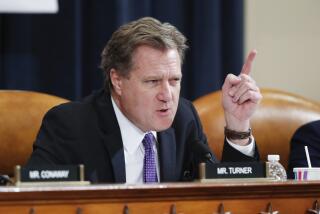New Espionage Charge Adds to Iraq Dispute
- Share via
UNITED NATIONS — Iraq leveled a new charge of espionage at U.N.-sponsored personnel Thursday in an escalating controversy touched off by reports of intelligence-sharing between the Clinton administration and the U.N. commission established to destroy Baghdad’s weapons of mass destruction.
The new allegation, in which Iraq charges that nongovernmental groups assigned to clear land mines in Iraq’s Kurdish northern provinces are actually fronts for British intelligence, would be a trivial one if it had not come in the midst of the espionage controversy.
Administration officials, meanwhile, acknowledged that U.N. weapons inspectors have relied on U.S. eavesdropping and other intelligence assistance in their effort to find Iraqi chemical and biological weapons labs that Baghdad was determined to conceal.
Had Iraq not tried to hide its weapons of mass destruction, officials insisted, the U.N. Special Commission, or UNSCOM, would have had no need for intelligence from the United States or other U.N. member countries.
“The word ‘intelligence’ has a sexy connotation,” State Department spokesman James B. Foley said Thursday. “What really is involved is a more mundane, prosaic reality . . . information-gathering on Iraq’s weapons of mass destruction programs. That’s what UNSCOM’s mission is all about.”
Nevertheless, some Western diplomats at the United Nations said the latest disclosures have handed Iraq a propaganda victory, at least in the short run. U.S. officials acknowledged that the controversy undermines UNSCOM and diminishes the chances that Iraq will ever allow the weapons inspectors to return to work. But these officials said it was unlikely that Iraq would have cooperated with the inspectors in any event.
Iraq’s diplomats have complained loudly that the weapons inspection program is a front for U.S., British and Israeli intelligence organizations.
And on Thursday, Iraqi Foreign Minister Mohammed Said Sahaf leveled the charge against Britain.
“The illegal presence in northern Iraq of personnel from these nongovernmental organizations constitutes a flagrant violation of Iraq’s sovereignty,” Sahaf said in a letter to the United Nations.
Although U.S. officials insisted that the intelligence cooperation with UNSCOM was intended only to facilitate the work of the arms inspectors, they acknowledged that the operation clearly produced an intelligence windfall for Washington as well.
For instance, since early last year, the United States has intercepted the coded conversations of the unit of the Iraqi Special Republican Guards that is in charge of concealing weapons of mass destruction programs. The U.S. has provided the U.N. arms inspectors with all of the overheard conversations deemed relevant to their work. Washington has retained all of the transcripts, almost certainly including information that was useful to the Pentagon in planning last month’s 70-hour bombing campaign.
However, officials insisted that the eavesdropping operation was tailored to meet UNSCOM’s needs, not the Pentagon’s.
The administration also denied that it had placed spies on the UNSCOM staff, although officials acknowledged that some inspectors have intelligence backgrounds.
“The business of weapons of mass destruction arms control is extremely serious and cannot be carried out by amateurs,” Foley said. “The United States has sent UNSCOM our best weapons experts, both from the government and private organizations.”
Reports describing the U.S.-UNSCOM intelligence relationship first appeared in the Washington Post and Boston Globe, attributed to sources close to U.N. Secretary-General Kofi Annan.
U.S. officials initially were furious at Annan but later concluded that the reports probably came from U.N. employees who personally oppose the UNSCOM operation, possibly because they are citizens of countries that have doubts about the commission and its controversial chairman, Australian Richard Butler.
Russia and China have called for Butler’s resignation, and France is proposing a system of monitoring rather than intrusive inspections.
Nevertheless, Annan, through his spokesman, Fred Eckhard, said the latest reports worried him because they seem to lend credence to Iraq’s charges that the U.S. used the U.N. to conduct espionage.
“It is not anything yet that has been proven,” Eckhard said. “It is still too soon to make full judgments.”
Eckhard denied that Annan was looking for a replacement for Butler as UNSCOM’s chief. He added that Annan will not conduct an investigation into the leaks.
“He is not into a witch hunt. He is not conducting any kind of investigation,” the spokesman said. “The Secretariat is open and transparent.”
UNSCOM requested help in tracking Iraq’s weapons of mass destruction in early 1996. For the first two years, the intelligence operation was not supervised by the United States. However, early last year, other governments dropped out, leaving the task entirely to Washington.
Information obtained from the eavesdropping is known to be extremely closely held. Only a few top officials of the U.S. government and of UNSCOM are authorized to read the reports.
Meanwhile, the House Permanent Select Committee on Intelligence announced that CIA Director George J. Tenet will be called to testify in public later this month on the prospects for overthrowing Iraqi President Saddam Hussein. The committee usually meets in secret, but its chairman, Rep. Porter J. Goss (R-Fla.), said the public has a right to hear Tenet’s report.
White House spokesman P. J. Crowley said critics now endorsing Iraq’s repeated charges of espionage are “looking through the wrong end of the telescope.”
The intensive inspections, with the help of U.S. experts, Crowley said, became necessary only after Baghdad failed to live up to the promises it made at the end of the 1991 Persian Gulf War. Continued Iraqi resistance to the inspections “has required UNSCOM to go to enormous lengths” to collect information, he said.
Goldman reported from the United Nations and Kempster from Washington.
* U.S. JET FIRES MISSILE: A U.S. F-16 jet targeted in the northern “no-fly” zone fires missile at Iraqi site. A10
More to Read
Sign up for Essential California
The most important California stories and recommendations in your inbox every morning.
You may occasionally receive promotional content from the Los Angeles Times.













